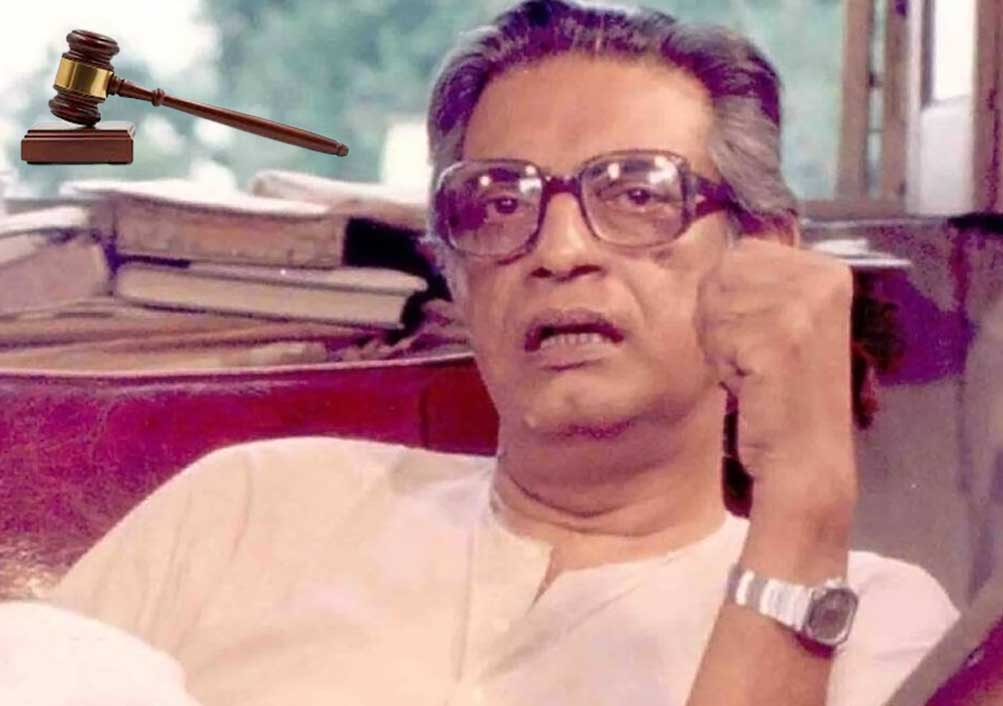In CS (Comm) 246 of 2021- DEL HC - Delhi High Court appreciates copyright of Satyajit Ray on 1966 film Nayak, refuses to injunct novelisation of screenplay asserted by producer RD Bansal
Justice C.Hari Shankar [23-05-2023]

Read Order: RDB And Co. HUF v HarperCollins Publishers India Private Limited
Simran Singh
New Delhi, May 24, 2023: In a Commercial Civil Suit, the Delhi High Court while rejecting the assertion of film producer RD Bansal that the copyright as well as the screenplay of the 1966 film ‘Nayak’ belonged to him, held that cinema legend Satyajit Ray, his son Sandip Ray and the Society of Preservation of Satyajit Ray Archives (SPSRA) owned the copyright and the producer had no right to injunct the ‘novelisation of the screenplay’ by the third party on the basis of license granted by the owners.
In the matter at hand, the RDB and Co. HUF, stated to be the Karta of the plaintiff-HUF, had commissioned Satyajit Ray to write the screenplay of, and to direct, the film- NAYAK which was released in 1966 and regarded as one of the masterworks of Bharat Ratna Satyajit Ray who was unarguably one of the greatest directors in recorded film history. The plaintiff sought to restrain publishing house Harpercollins from novelising the film written by Bhaskar Chattopadhyay as it constituted infringement of its copyright under Section 51 of the Copyright Act,1957 (‘Copyright Act’) however, the book was published in May 2018.
Harpercollins vehemently opposed the contentions of the plaintiff and submitted that the copyright in the screenplay was vested in Satyajit Ray and after his death in 1992, the same was vested in his son Sandip Ray and SPSRA, of which Sandip Ray was a member. They claimed that they had appropriately obtained license from Sandeep Ray and SPSRA to novelise the screenplay of the film.
The issue for consideration before the Court was who owned the copyright in the screenplay of a film, if the author had been commissioned by the producer of the film to write the screenplay? Is it the producer of the film, or the author of the screenplay?
While disagreeing with the contentions of RDB and Co. HUF and refusing to injunct Harpercollins from novelising the screenplay of the movie, the Bench held that the right could be assigned by Satyajit Ray and, consequent on his demise, by his son and others on whom the right devolved – on any other person, in accordance with Section 18 (1) 44 of the Copyright Act. “The assignment of the right to novelise the screenplay of the film 'Nayak' by Sandip Ray and the SPSRA in favour of the defendant was, in order and in accordance with the provisions of the Copyright Act.” However, on the other hand, the assertion by the plaintiff of the copyright in the screenplay of the film ‘Nayak’ was unsupported by any provision in the Copyright Act
The Bench noted that the plaintiff HUF had not chosen to discredit the grant of right to novelise the screenplay of the film to the publishing house on any ground other than the contention that the copyright was vested with it and not with Sandip Ray and the SPSRA.
The Bench stated that “There is no dispute about the fact that the screenplay of the film is entirely the work of Satyajit Ray. The plaintiff has contributed no part thereto. Indeed, though this fact is not of particular relevance, even the film ―Nayak was entirely the directorial effort of Satyajit Ray. The plaintiff is merely the producer of the film. ” It further said that the Copyright Act clearly envisages that a copyright in a cinematograph film was distinct and different from a copyright in any literary work which may be a part of the film.
The Court said that being the author, Satyajit Ray was the first owner of the copyright to the screenplay and the right to novelise it was also vested in him and the later conferment of this right by his son and SPSRA on the third party was ‘wholly in order’. "Inexorably, the conclusion is that under Section 17 of the Copyright Act, Satyajit Ray, as the author of the screenplay of the film Nayak, was the first owner of the copyright.. The contention that plaintiff is the owner of the copyright in the screenplay in the film Nayak, therefore, cannot be accepted and is accordingly, rejected,” said the court.
The court also noted that it was unable to find, in the communications between the parties, any ‘unequivocal acknowledgment’ by HarperCollins of the plaintiff‘s copyright in the screenplay of the film.
“For the aforesaid discussion, the plaintiff has no right whatsoever, in law, to injunct the defendant from novelizing the screenplay of the film Nayak.” Accordingly, prayer (a) in para 34 of the plaint (to injunct the novelisation) could not be granted and was accordingly, dismissed, the court said.
Sign up for our weekly newsletter to stay up to date on our product, events featured blog, special offer and all of the exciting things that take place here at Legitquest.




Add a Comment